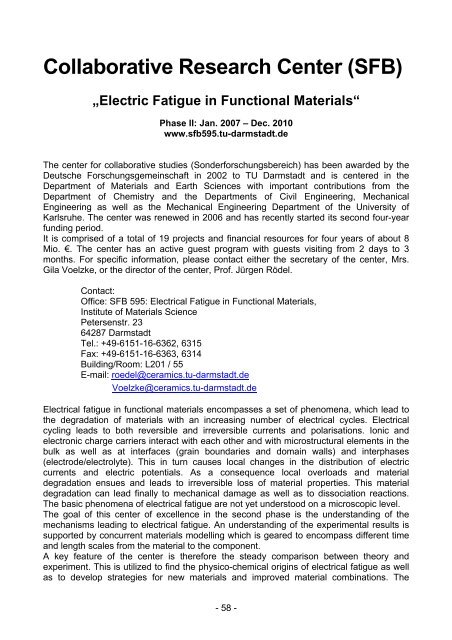Electronic Material Properties - und Geowissenschaften ...
Electronic Material Properties - und Geowissenschaften ...
Electronic Material Properties - und Geowissenschaften ...
You also want an ePaper? Increase the reach of your titles
YUMPU automatically turns print PDFs into web optimized ePapers that Google loves.
Collaborative Research Center (SFB)<br />
„Electric Fatigue in Functional <strong>Material</strong>s“<br />
Phase II: Jan. 2007 – Dec. 2010<br />
www.sfb595.tu-darmstadt.de<br />
The center for collaborative studies (Sonderforschungsbereich) has been awarded by the<br />
Deutsche Forschungsgemeinschaft in 2002 to TU Darmstadt and is centered in the<br />
Department of <strong>Material</strong>s and Earth Sciences with important contributions from the<br />
Department of Chemistry and the Departments of Civil Engineering, Mechanical<br />
Engineering as well as the Mechanical Engineering Department of the University of<br />
Karlsruhe. The center was renewed in 2006 and has recently started its second four-year<br />
f<strong>und</strong>ing period.<br />
It is comprised of a total of 19 projects and financial resources for four years of about 8<br />
Mio. €. The center has an active guest program with guests visiting from 2 days to 3<br />
months. For specific information, please contact either the secretary of the center, Mrs.<br />
Gila Voelzke, or the director of the center, Prof. Jürgen Rödel.<br />
Contact:<br />
Office: SFB 595: Electrical Fatigue in Functional <strong>Material</strong>s,<br />
Institute of <strong>Material</strong>s Science<br />
Petersenstr. 23<br />
64287 Darmstadt<br />
Tel.: +49-6151-16-6362, 6315<br />
Fax: +49-6151-16-6363, 6314<br />
Building/Room: L201 / 55<br />
E-mail: roedel@ceramics.tu-darmstadt.de<br />
Voelzke@ceramics.tu-darmstadt.de<br />
Electrical fatigue in functional materials encompasses a set of phenomena, which lead to<br />
the degradation of materials with an increasing number of electrical cycles. Electrical<br />
cycling leads to both reversible and irreversible currents and polarisations. Ionic and<br />
electronic charge carriers interact with each other and with microstructural elements in the<br />
bulk as well as at interfaces (grain bo<strong>und</strong>aries and domain walls) and interphases<br />
(electrode/electrolyte). This in turn causes local changes in the distribution of electric<br />
currents and electric potentials. As a consequence local overloads and material<br />
degradation ensues and leads to irreversible loss of material properties. This material<br />
degradation can lead finally to mechanical damage as well as to dissociation reactions.<br />
The basic phenomena of electrical fatigue are not yet <strong>und</strong>erstood on a microscopic level.<br />
The goal of this center of excellence in the second phase is the <strong>und</strong>erstanding of the<br />
mechanisms leading to electrical fatigue. An <strong>und</strong>erstanding of the experimental results is<br />
supported by concurrent materials modelling which is geared to encompass different time<br />
and length scales from the material to the component.<br />
A key feature of the center is therefore the steady comparison between theory and<br />
experiment. This is utilized to find the physico-chemical origins of electrical fatigue as well<br />
as to develop strategies for new materials and improved material combinations. The<br />
- 58 -


